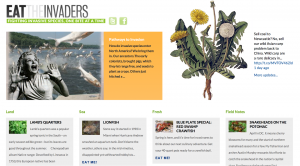- Nov. 19, 2021, 7:30 pm US/Central
- Dr. Joe Roman, University of Vermont
- Eat the Invaders
- Tickets: $4 access fee
- Purchase tickets »
For the past decade, Joe Roman has been editing Eat the Invaders! a website promoting the control of invasives one bite at a time. Roman will discuss examples of gateway invasives, species such as lionfish and exotic carp, that have been at the forefront of the invasivore movement and present evidence that such efforts can help native biodiversity. He’ll also share some recipes.
Joe is editor ’n’ chef of eattheinvaders.org. He is also the author of Listed: Dispatches from America’s Endangered Species Act, winner of the 2012 Rachel Carson Environment Book Award, and Whale. He has written for the New York Times, Audubon, New Scientist, Slate, and other publications. You can read his work at joeroman.com.
He received his Ph.D. from Harvard University in 2003 in Organismic and Evolutionary Biology and his Master’s degree in Wildlife Ecology and Conservation from the University of Florida. Born and raised in New York, Joe considers King Kong as an early conservation influence.






